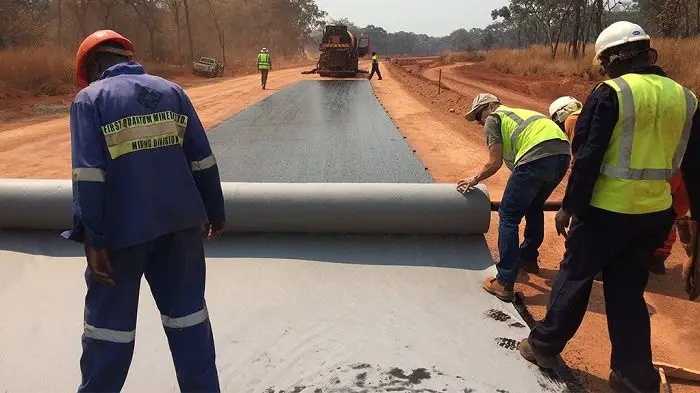Geosynthetic products manufacturer Fibertex South Africa has designed a new range of geotextiles that can be used in civil engineering, mining and road construction, and maintenance projects.
Fibertex South Africa export sales manager Chris Powell points out that the range includes Fibertex AM-2, which is a flexible needle, punched nonwoven fabric with added thermal bonding on one side.
“The purpose of this pre-compressed polypropylene (PP) bitumen-saturated paving fabric is to prevent the ingress of surface water into the selected layers of the road prism, thereby reducing the bearing capacity of these layers.”
He explains that the membrane acts as a stress absorbing membrane interlayer to prevent surface stress cracking by absorbing stresses imposed by differential loads.
Fibertex AM-2 prevents propagation of stress cracks from lower surface layers such as older asphalt or chip seal layers in the case of a road reseal.
In addition, when using Fibertex F-grade geotextiles – another product within the range – in a separation application below the layer works of the road prism, the road design can be altered to include less of the costly imported engineered fill, which reduces the thickness of the selected layers, thereby resulting in a more cost-effective design.
“Without the use of a separation fabric in weak subgrade conditions, intermixing of engineered aggregate into the weak subgrade could occur. As a result, the bearing capacity of the base course is reduced, which could lead to base course failure of the road,” he adds.
Substantial infrastructural cost reductions can be achieved with the use of PP Fibertex AM-2 in road construction and maintenance projects.
Meanwhile, virgin PP geotextiles, with a high level of chemical stability under a range of environmental conditions, have advantages in installations where the cost of failure may be extreme, in both financial and environmental terms.
Fibertex AM-2 system can be applied mechanically for large volume installations, as well as manually in cases where narrow-width installations are required.
According to Powell, Fibertex’s Hammarsdale manufacturing facility is the largest plant in South Africa that manufactures geotextiles out of virgin PP.
“Needle-punched materials with a strong elastic bonding between the fibres are used in building and construction works for separation, filtration, drainage, protection, stabilisation and reinforcement, as well as in the automotive, furniture and filtration markets,” he says.
Powell notes that concern for the environment is critical at Fibertex. There are no chemical binders used in the product and production processes.
In addition to the range of products made from virgin PP, Fibertex also has a range of products based on recycled polyester.
“No waste that has to be discarded is produced within the plant. Similarly, all products produced are 100% recyclable.
“Consequently, Fibertex nonwovens are not harmful to the environment.
“The company supports its extensive range of geosynthetic products with a technical advisory and support service throughout Africa,” he concludes.

